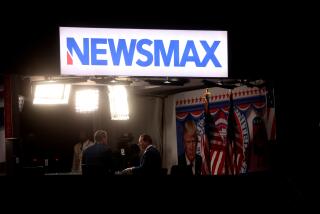Canal Plus Sues NDS Group
- Share via
Vivendi Universal’s Canal Plus Group on Tuesday accused a competitor controlled by News Corp. of sabotaging a security system for its digital TV service, in a rare lawsuit that exposes the fierce rivalries between media giants.
In the lawsuit filed in U.S. District Court in San Jose, Canal Plus alleges that NDS Group conspired to illegally crack its digital TV “smart card” and then provided the code to a Web site frequented by counterfeiters.
NDS, based in Britain, is the leading maker of security software for digital TV and is a rival to Canal’s technology division based in Cupertino, Calif. The suit seeks more than $1 billion in damages.
“We will not stand by and let such illegal activities, which shake the foundation of the digital TV business, go unpunished,” said Francois Carayol, Canal Plus Technologies chief executive. Canal Plus is the European television and film division of Vivendi Universal, Europe’s largest media company.
NDS called the claims “outrageous and baseless” and said it plans to file a counterclaim. Group President Abe Peled denied that his company had any involvement in piracy and said Canal Plus had only itself to blame.
“This lawsuit is a blatant attempt by Canal Plus both to deflect criticism of its new-generation card, which is not believed to be state of the art, and to shift blame for its inadequate technology and its past losses,” Peled said.
The company also contends that Canal was trying to lure away the very employee it accuses of cracking the security system.
The lawsuit is likely to exacerbate the acrimony between flamboyant Vivendi CEO Jean-Marie Messier and News Corp. Chairman Rupert Murdoch, whose companies are competing for dominance of the pay-television market in Europe.
“These guys are out to eat each other’s lunch so they’re always looking at ways to get a competitive advantage,” said George Nichols, a media analyst with Morningstar Inc. in Chicago.
The lawsuit also comes amid a fierce push by Hollywood studios to fight piracy of movies from the Internet and digital TV. Entertainment giants, including News Corp.’s Fox, have aggressively lobbied in Washington for copyright protection technology.
Until now, Hollywood studios have presented a united front in combating piracy and have not pointed the finger at one another.
“There’s a certain poetic justice here,” said Gary Klein, vice president of the Consumer Electronics Assn. in Arlington, Va. “You have a content company that recently accused the consumer electronics industry of fostering piracy now being accused of piracy.”
The seriousness of the allegations surprised many analysts.
“Piracy is something you expect from hackers in their bedrooms and not from corporations,” Nichols said.
Canal Plus’ lawsuit centers on so-called smart cards, which play a crucial role for most satellite and overseas cable TV companies, acting as the key that opens the electronic locks on programming. Subscribers need a special set-top receiver to tune in the programming, and the receiver cannot unscramble the shows without a smart card.
TV pirates try to defeat the system by creating fake smart cards with copies of the software keys needed to unscramble programming. If they succeed, they enable users to watch pay-per-view movies and other premium programming for free.
Virtually every scrambling system has been hacked, industry executives say, forcing satellite and cable operators to fight back with electronic countermeasures or new smart cards.
Canal Plus’ technology is used by 12.5 million customers, mostly in Europe. NDS, 80%-owned by News Corp., has about 27.3 million users.
Canal Plus claims that NDS used top engineers at a laboratory in Israel to crack the Canal Plus smart card and then provided the security code in 1999 to a Web site used by counterfeiters. Canal Plus contends that the action encouraged the illegal copying of its smart card and has hindered the company’s efforts to expand its business in Europe and the United States.
The company alleges violations of the Racketeer Influenced and Corrupt Organizations Act, copyright laws and California laws on unfair business practices. Canal offered no evidence to support its allegations.
“Our intention is to provide that evidence in the course of the lawsuit,” Carayol said.
Times staff writer Jon Healey contributed to this report.
More to Read
The biggest entertainment stories
Get our big stories about Hollywood, film, television, music, arts, culture and more right in your inbox as soon as they publish.
You may occasionally receive promotional content from the Los Angeles Times.











